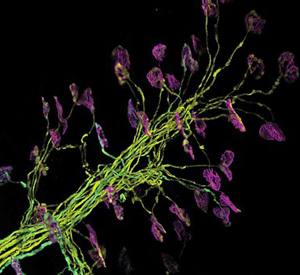Catriona McGill is a project manager at Battolyser Systems, responsible for managing the development of their first factory. Battolyser Systems is a cleantech spin-out from the Technical University of Delft that develops and manufactures a breakthrough integrated battery/electrolyser product. The Battolyser unit can store electricity and produce green hydrogen from renewable power to balance societal demand with supply.

“I remember saying to my friends: “What is the point? Why are we learning this? When am I ever going to use this in a job?” And now, 15 years later, I can tell you exactly why maths is genuinely important.”
The happiest accident of all
I’m currently a project manager at a spin-out from the Technical University of Delft, called Battolyser Systems.
At school, I always liked maths and was good at it. However, in my early teens, I thought I wanted to be a lawyer because I was inspired by Elle Woods from Legally Blonde. At age 16 I did a week of work experience at a law firm but quickly realised that it would be a terrible job for me – I would not be happy sitting at a desk all day.
So, I swapped from wanting to pursue a legal career to a career involving science and maths. I soon realised that I enjoyed it most when I was applying science and maths to the real world. I think this is a fair description of what engineering is — maths applied to real-world problems. So, I applied to study engineering and was accepted onto the general engineering course at the University of Cambridge.
The first two years were tough, and I struggled with the volume of work involved. In my third and fourth years, I specialised in a topic called ‘manufacturing engineering’. I chose it because the topic sounded interesting and also because that was what my best friend had chosen and I wanted to hang out with her in lectures! (Not the best way to make important decisions…)
So, I fell into it partly by accident, but it was the happiest of accidents because I absolutely loved it. I got to work on projects in real factories — I spent a month in a lighting factory in Doncaster and two months in a specialist electric motor shaft factory in Hungary.
Half of the modules on the course were technical, but the other half were non-technical— people management, organisational behaviour, technology development roadmapping… I had no clue at the time, but the marriage of these topics was the perfect background for working in hardware start-ups, which is what I do now.
Working with cleantech start-ups
When I left university, I didn’t know much about the world of work, so I decided to pursue a career many of my friends were applying for — strategy consulting. I did that for a few years and I learnt a huge amount, but I really missed the engineering aspects. So, I joined a start-up called Desolenator, working on solar-powered desalination. The team was only four people when I started and had grown to 25 people by the time I left, six years later. I absolutely loved my time there.

Desalination (turning seawater into drinking water) is a really important technology, but current methods have a very high carbon footprint. At Desolenator, we powered this process with solar energy in a clever way. We had projects in Dubai and India, and I loved the travel involved.
I recently joined another clean-tech company, Battolyser, which has developed an integrated battery and electrolyser technology. This product can both store electricity and produce hydrogen in a very flexible and low-cost manner. Ultimately, we think we can make the cheapest possible ‘green’ hydrogen (i.e. hydrogen produced from renewable energy).
Conceptualising a factory
The best thing about my job is that you get to do something different every day. Currently, I am spending my time working on the set-up of our first factory.
At the moment, this involves answering questions such as: What are the manufacturing steps involved? What parts are we making ourselves, and what are we buying? How many production lines do we need? What size does the building need to be? In the future, I’ll be on site whilst the factory is being installed and commissioned.
At one of the factory site locations we’re considering, we would be building on top of an old coal-fired power plant. I love the symbolism of that — going from coal to renewables.
What’s the point? This is the point
I speak regularly at Maths4Girls events, mainly their webinars, to tell kids about why maths is important at school and what you can do with it. I can speak very specifically about it because I have a vivid memory of being in year nine (aged 13) and saying to my friends: “What is the point? Why are we learning this? When am I ever going to use this in a job?” And now, 15 years later, I can tell you exactly how I use the maths I learned at school every day in my job now.
Many women I know who studied engineering (myself included!) had at least one parent who worked in science or maths. I don’t know if this a real trend or if I just have a small sample size, but I would love for kids to be aware of engineering as a career, even if they don’t have a parent working in this field, and that’s why I think the Maths4Girls events are really important.
Tackling the juicy and important problem
I think everybody wants a purposeful and meaningful job. For me, the food-energy-water nexus is one of the most important topics to work on. I’m lucky that my skillset allows me to have a role I enjoy (project management), at a company working on a solution to a really juicy and important problem (the energy transition).
The more you practice, the easier it becomes

There’s a TED talk where the speaker, Dr Lara Boyd, discusses the idea that the more you do something, the more neural pathways you get and the better and easier it becomes. That TED talk really stuck with me because it suggests you can get better at anything with practice. When it comes to maths, I think some people are born Einsteins, but most people, myself included, just have to practice. And the more you practice maths, the more neural pathways you make and the easier it becomes. You won’t know all the answers when you start and you won’t always get it right, and that is totally normal.
Reach for the stars
The person who helped cultivate my love of maths is my dad. He studied physics and is really into space and astronomy. He’s retired now and astronomy is still what he does in his free time.
At school, Dad always helped me with my maths homework, and he is definitely the one that made me feel like I could ‘do’ maths.
Many minds = better solutions
Diversity of thought in maths is so important because so much of our lives is dictated by science, technology and engineering, which are all based on maths. If you have a very similar group of people working in tech companies, they only know one perspective and they’ll only design for people like them.
There are lots of horror stories of when something has been designed with only one gender or race in mind. For instance, voice recognition software that works for male voices and not female voices, and automated hand dryers that recognise white skin better than skin of colour.
Those are tangible examples, but I think the conclusion to take from this is that the wider the set of experiences of the designing team, the more people they will serve. This is very important for buildings, cities, cars, medicines, smartphones… All of it.
We need more engineers, and we especially need more engineers from a wider range of backgrounds.
Levelling the playing field
I remember an older colleague telling me she was concerned that when young people come out of school now, young women especially, they think they’re entering an equal workforce, but it’s still not an even playing field, particularly in male-dominated environments.
She thinks we aren’t equipping young women with the information and skills they need, to be aware that things aren’t equal in the workplace and how to handle it if it affects them. I think things are changing for the better, but it’s still good to keep it in mind.
From concept to reality
One of the things I love most about my job is seeing a project go from the design phase all the way to a real-life installation, and I can’t wait to see our factory taking shape.
Outside of work, I just had an offer accepted on a (very run-down) house with my boyfriend, and that’s a whole other project!
Neural pathways in the brain image CC BY 2.0, University of Cambridge Department of Engineering





